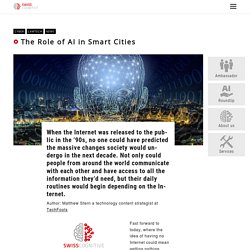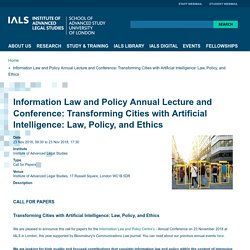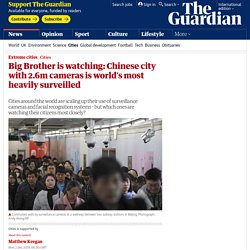

AI in Smart Cities - SwissCognitive - The Global AI Hub. Author: Matthew Stern a technology content strategist at TechFools Fast forward to today, where the idea of having no Internet could mean getting nothing done that day.

Communication relies on the Internet. Many jobs rely on the Internet. Society has become dependent on the Internet, and the connected world as a whole, and nowhere is this better exemplified than in smart cities. What are Smart Cities? Image from Unsplash.com The first “smart city” appeared in 1994 in Amsterdam. Since then, smart cities have grown. Perhaps the most interesting addition to smart cities is the addition of . How is Used in Smart Cities Security The past decade has seen multiple cities install facial recognition cameras in order to deter crime. Allows for a platitude of ways to deter or detect crime. Can also be used to create sensors capable of parsing certain sounds, such as gunshots. Machine Learning for Traffic Management. Information Law and Policy Annual Lecture and Conference: Transforming Cities with Artificial Intelligence: Law, Policy, and Ethics.
Description Transforming Cities with Artificial Intelligence: Law, Policy, and Ethics We are pleased to announce this call for papers for the Information Law and Policy Centre’s - Annual Conference on 23 November 2018 at IALS in London, this year supported by Bloomsbury’s Communications Law journal.

You can read about our previous annual events here. We are looking for high quality and focused contributions that consider information law and policy within the context of improving the governance of the public interest within cities through the use of AI-based systems. Whether based on doctrinal analysis, or empirical research, papers should offer an original perspective on the implications posed by the use of algorithms and data-driven systems for improving the effectiveness of the public sector whilst also ensuring that such processes are governed by frameworks that are accountable, trustworthy, and proportionate in a democratic society.
Topics of particular interest in 2018 include: Japanese hotel chain sorry that hackers may have watched guests through bedsi... Japanese hotel chain HIS Group has apologised for ignoring warnings that its in-room robots were hackable to allow pervs to remotely view video footage from the devices.

The Henn na Hotel is staffed by robots: guests can be checked in by humanoid or dinosaur reception bots before proceeding to their room. Facial recognition tech will let customers into their room and then a bedside robot will assist with other requirements. Tokyo - Robot's video vulnerability puts hotel guest privacy at risk. The Japanese hotel conglomerate, HIS Group, an organization which prides itself on being technologically innovative, seems to need a reboot on guest privacy and security.

Their Henn na Hotel Maihama Tokyo Bay is run by robots (see video below). Two weeks ago we learned that security researcher, Lance Vick discovered the Tapia Robot which the Henn na Hotel has next to every bedside had a severe vulnerability – the robot could be modified to allow remote video viewing of the hotel room. Vick, did what every responsible security researcher does when discovering a vulnerability – he documented it, and then contacted the company in July 2019 and was ignored.
So after repeatedly failing to get HIS Group’s and manufacturer’s attention over the course of 90 days he took the vulnerability public with a tweet: Amp.theguardian. Qiu Rui, a policeman in Chongqing, was on duty this summer when he received an alert from a facial recognition system at a local square.

There was a high probability a man caught on camera was a suspect in a 2002 murder case, the system told him. The city’s surveillance system scans facial features of people on the streets from frames of video footage in real time, creating a virtual map of the face. It can then match this information against scanned faces of suspects in a police database. If there is a match that passes a preset threshold, typically 60% or higher, the system immediately notifies officers. Three days later the police captured the man, who eventually admitted that he was the suspect.
Cases such as this, where facial recognition systems are used to help local police crack crime cases, are not unusual in the south-west China city, which recently ranked first in an analysis of the world’s most surveilled cities compiled by the UK-based technology research firm Comparitech. Smart cities need 'heightened awareness' of privacy, Ontario assistant privacy commissioner says. Internet of Things (IoT) technology is a reality that cities across the world are waking up to, and the proliferation of smart city projects means that more municipalities than ever are moving forward with “technology to improve our lives” – but such projects need to include a more “heightened awareness in privacy,” Ontario assistant information and privacy commissioner David Goodis says.

In early June, during the Municipal Information Systems Association (MISA) Ontario chapter’s annual conference in Hamilton, Ont., Goodis told IT World Canada that Ontario is “moving forward on smart cities” but that the success of its projects are dependent on the cities involved being transparent and open about their intentions, which includes addressing the privacy concerns of their citizens.
Goodis said that when considering smart city projects, governments need to research the publics’ concerns and have answers ready for pertinent questions like: Who owns my information? Related Download. Reclaiming the Smart City: Personal Data, Trust and the New Commons.